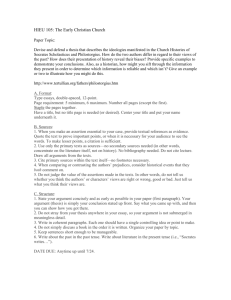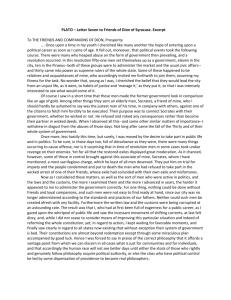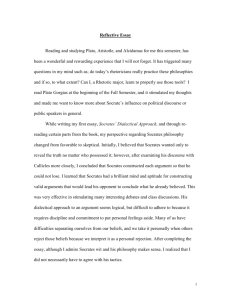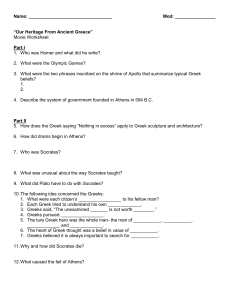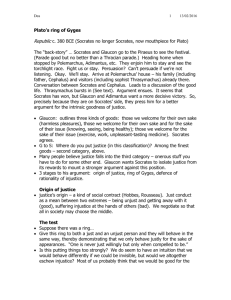Writing Philosophy Essays
advertisement
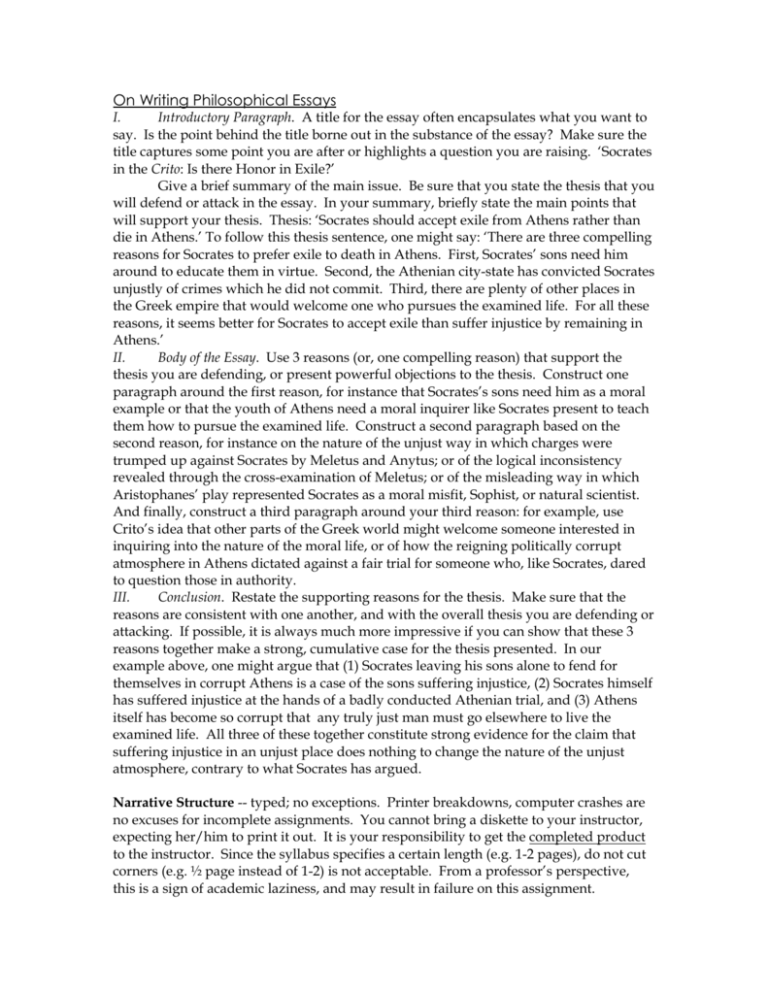
On Writing Philosophical Essays I. Introductory Paragraph. A title for the essay often encapsulates what you want to say. Is the point behind the title borne out in the substance of the essay? Make sure the title captures some point you are after or highlights a question you are raising. ‘Socrates in the Crito: Is there Honor in Exile?’ Give a brief summary of the main issue. Be sure that you state the thesis that you will defend or attack in the essay. In your summary, briefly state the main points that will support your thesis. Thesis: ‘Socrates should accept exile from Athens rather than die in Athens.’ To follow this thesis sentence, one might say: ‘There are three compelling reasons for Socrates to prefer exile to death in Athens. First, Socrates’ sons need him around to educate them in virtue. Second, the Athenian city-state has convicted Socrates unjustly of crimes which he did not commit. Third, there are plenty of other places in the Greek empire that would welcome one who pursues the examined life. For all these reasons, it seems better for Socrates to accept exile than suffer injustice by remaining in Athens.’ II. Body of the Essay. Use 3 reasons (or, one compelling reason) that support the thesis you are defending, or present powerful objections to the thesis. Construct one paragraph around the first reason, for instance that Socrates’s sons need him as a moral example or that the youth of Athens need a moral inquirer like Socrates present to teach them how to pursue the examined life. Construct a second paragraph based on the second reason, for instance on the nature of the unjust way in which charges were trumped up against Socrates by Meletus and Anytus; or of the logical inconsistency revealed through the cross-examination of Meletus; or of the misleading way in which Aristophanes’ play represented Socrates as a moral misfit, Sophist, or natural scientist. And finally, construct a third paragraph around your third reason: for example, use Crito’s idea that other parts of the Greek world might welcome someone interested in inquiring into the nature of the moral life, or of how the reigning politically corrupt atmosphere in Athens dictated against a fair trial for someone who, like Socrates, dared to question those in authority. III. Conclusion. Restate the supporting reasons for the thesis. Make sure that the reasons are consistent with one another, and with the overall thesis you are defending or attacking. If possible, it is always much more impressive if you can show that these 3 reasons together make a strong, cumulative case for the thesis presented. In our example above, one might argue that (1) Socrates leaving his sons alone to fend for themselves in corrupt Athens is a case of the sons suffering injustice, (2) Socrates himself has suffered injustice at the hands of a badly conducted Athenian trial, and (3) Athens itself has become so corrupt that any truly just man must go elsewhere to live the examined life. All three of these together constitute strong evidence for the claim that suffering injustice in an unjust place does nothing to change the nature of the unjust atmosphere, contrary to what Socrates has argued. Narrative Structure -- typed; no exceptions. Printer breakdowns, computer crashes are no excuses for incomplete assignments. You cannot bring a diskette to your instructor, expecting her/him to print it out. It is your responsibility to get the completed product to the instructor. Since the syllabus specifies a certain length (e.g. 1-2 pages), do not cut corners (e.g. ½ page instead of 1-2) is not acceptable. From a professor’s perspective, this is a sign of academic laziness, and may result in failure on this assignment. Don’t write one long paragraph. That is very confusing to the reader, and it’s likely a good indicator of the confusion in the writer’s mind. Keep in mind your audience: assume that your reader, even if an instructor, is unfamiliar with special terminology; so, define "Socratic irony" or "ontological argument". Use the above structure (introduction, body, conclusion) as a simple outline for the essay. This sort of organization shows that you’ve thought out the logical structure, coherence, and interconnectedness of the ideas and thesis in your essay. Employ as much or as little citation from the text as you need to make your case. Support from the text should help strengthen, not weaken your argument. Avoid drifting off into irrelevant topics. Use proper notation (Stephanus pagination, if citing Plato, Aristotle, and medieval texts), thus giving credit to those words and phrases you have borrowed; use technical terminology properly. Avoid plagiarism at all costs: it will result in failure for the assignment or the course. Avoid fragments – these are signs of incomplete or arrested thoughts or assumed connections on your part. Often, in the use of fragments, one is over-compressing some complex thoughts into a scanty space. Break lengthy, complex thoughts down into shorter, more comprehensible, but complete sentences. There are no excuses for spelling, punctuation, or grammar mistakes. Proofread intelligently – perhaps someone else needs to do this for you. Do not depend on Spellcheck – it does not catch misused words (‘their’ for ‘there’ or ‘they’re’). Write in the 3rd person voice. The 1st person has its uses, but in philosophy and the sciences, we stress the student’s ability to abstract from their personal experience. Try to see things from another person’s or culture’s perspective. We often stress the ‘reasonable person’s point of view’; this is better captured by a 3rd person narrative. Also, the first person makes it all too easy to pretend to infallibility; none of us is immune from error. And, the first person voice is always overly-cautious: ‘it seems to me’; ‘in my opinion, Socrates is saying’; ‘I don’t see how Socrates can say’. This puts you already at a remove from the action. Just state boldly what Socrates is saying; take a risk and state unqualifiedly what his position is. You might get it wrong, but that’s fine; you need to get used to stating things boldly. Taking a stand is central to developing yourself as a mature writer and thinker. When you find a key idea or theory, explain it in some detail. Don’t assume the reader automatically sees the connection that you do. State as completely as you can how this idea/theory is a key to interpreting the passage under consideration. Most sophisticated writers intentionally employ our ordinary language in specialized ways; learn to think and write in terms of what they mean by their use of that word/phrase in this particular sentence/passage/text. Get away from vague statements. If you visualize another alternative, then sketch out in some detail how that alternative works. Saying ‘I see a better answer than these two thinkers came up with’ is both arrogant and dismissive if you provide no evidence that you, like these great thinkers, have wrestled with these ideas. Avoid dismissing great ideas of the past simply because many people today don’t accept them. Learn to think historically, giving credence to great ideas, even if they ultimately prove to be mistaken. Great ideas, principles, or theories always have a particular historical context in which they arose; bothering to learn that historical context enables us to appreciate the depth and richness of that context and see its continuing importance or relevance.




